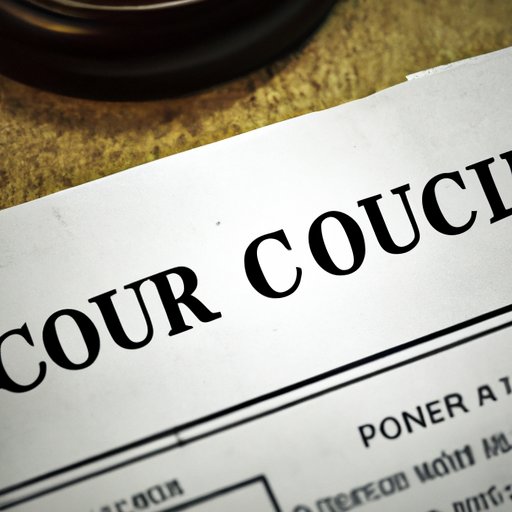
Introduction
Receiving court papers can be an intimidating moment, especially if you weren’t expecting them. However, what happens if you don’t ever receive those important legal documents? Whether it was due to an error in delivery or simply not receiving it, the consequences of not responding to court orders can be severe and long-lasting. In this article, we will discuss the potential legal ramifications of not receiving court papers and provide guidance on what you should do to protect yourself and your legal interests.
Avoiding Legal Consequences: The Consequences of Not Receiving Court Papers
The legal system is designed to provide adequate notice to all parties involved in a lawsuit. Failure to respond to such notice can result in default judgments, fines, and being held in contempt of court. Default judgments are essentially automatic legal wins for the party that initiated the lawsuit, as the defendant failed to respond in a timely manner. In some cases, such judgments can lead to wage garnishments, liens, and even property seizures. Being held in contempt of court can also lead to fines and even jail time.
What to Do If You Don’t Receive Court Papers: Your Legal Rights Explained
If you believe that you did not receive court papers, it is crucial to take immediate action. The first step would be to contact the court clerk to obtain a copy of the documents that were sent. You can also hire an attorney to assist in navigating the legal system and protect your interests. If you have received a default judgment already, you may be able to file a motion to set aside the judgment within a certain time frame. The court will then determine whether the judgment should be vacated based on factors such as excusable neglect or lack of proper notice.
The Service Process: Understanding How Court Papers are Delivered and How to Respond
It’s important to understand how court papers are typically served in order to know what to expect and how to respond. Court papers are typically delivered by a process server who will personally deliver the papers to the intended recipient. Alternatively, the papers can be sent via certified mail or even email in some cases. If you did not receive the document, you may be able to file a request for more time to respond or request for alternative service methods if traditional methods failed. It is important to respond in a timely manner as failure to do so can result in legal consequences for you.
Protecting Your Interests: Preventing Legal Problems by Ensuring Proper Service of Court Papers
The best way to avoid legal problems related to not receiving court papers is to ensure proper service in the first place. This can involve staying up to date on any legal proceedings that may concern you and working with an attorney to ensure you receive all necessary documents. Additionally, you can choose to waive formal service by signing a document acknowledging that you have received the court papers. This can help avoid technicalities related to service and ensure you have adequate notice of legal proceedings.
Navigating the Legal System: What Happens If You Never Get Served Court Papers
Real-life examples of what can happen when court papers are not properly served are plentiful. In one example, a woman was awarded a judgment against her ex-spouse, who did not receive notification of the initial proceedings. The court ultimately ruled that the papers were served legally and the judgment was upheld. It is critical to take proactive measures to protect your interests under such circumstances.
Conclusion
The consequences of not receiving court papers can be severe and long-lasting, leading to default judgments and being held in contempt of court. It’s important to take immediate action by contacting the court clerk or hiring an attorney if you believe you have not received court papers. Additionally, understanding the service process and working with an attorney to ensure proper service can help prevent legal problems in the future. By taking such measures, you can protect your legal rights and ensure that you have adequate notice of any legal proceedings related to you.





